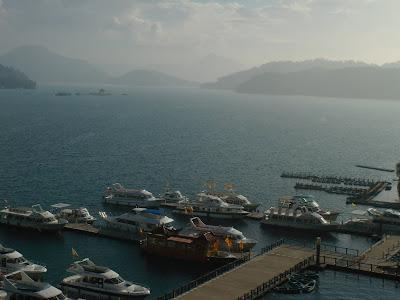

Sun Moon Lake has it all, Chinese and aboriginal culture, fantastic scenery, and a collection of great hiking trails, whatever you want to come for, and however you like to travel, this tourist hotspot will both accommodate and entertain you. There is an excellent camping ground situated right next to the lake, the site is large, and is well provided for with hot showers and toilets, all of which are kept clean. Be warned though, that it can be a difficult place to find, so look out for the 6.5 km marker on the road going round the lake, the turnoff for the campsite is very nearby. If the idea of sleeping outside doesn’t grab you though, there is also an excellent range hotels, from budget accommodation right up to Taiwan’s most expensive, The Lalu 涵碧樓. Many of these have spa facilities and views across the lake, and, if you were so inclined, you could easily spend your entire time relaxing within the confines of your hotel. The only problem with that though, is that wouldn’t get to see the rest of what the area has to offer.

Probably the most imposing of Sun Moon Lake’s attractions is Wen Wu Temple 文武廟. As you approach Wen Wu, the first thing you notice is its immense size. This isn’t really just one temple, but rather a whole complex of shrines, courtyards, and pagodas. Guarding the entrance are Asia’s largest stone lions, and behind them lie the various shrines which honor both the pen of scholastic learning, and the sword of military might. The Temple’s main gate, its elaborate carvings, and sloping tiled roofs are attractions in their own rights, and it is here at the temple that you’ll be able to take some of your best, and most artistic photos of Sun Moon Lake itself.



Though Wen Wu might be the grandest place you’ll visit, there’s no doubt that the Tsen Pagoda 慈恩塔 is the loftiest. Built by Chiang Kai Shek to commemorate his mother, the 9-floored Tsen Pagoda, or the Pagoda of Filial Virtue is a wonderfully serene site. The tower sits in the middle of a large open square, the floor of which is covered with white gravel. On sunny days these little stones are dazzlingly bright, and the whole place looks as if it might be covered in snow. The pagoda is lit up at night, and though not many people venture up there after the sun has gone down, it is then that the landmark is at its most stunning.


Smaller, more remote, and les visited than Wen Wu, is the Hsuanchuang Temple 玄狀寺. The temple enshrines some small stones, said to have been found among the ashes of the historical Buddha. The stones, which are called ssu-li-tzu, are apparently often found in the remains of devout Buddhist teachers after their cremations. The ssu-li-tzu at Hsuanchuang Temple are regarded as very important Buddhist relics.



Sun Moon Lake has some strong aboriginal influences, and is historically the home of the Thao, or Shao aboriginal tribe. For aboriginal souvenirs and cuisine, and to get a look at a working aboriginal village, you should go Idashao (also known as Dahuasho德化社), about halfway around the lake. For a more comprehensive, and touristy view of aboriginal culture, head to the nearby Formosan Aboriginal Culture Village九族文化村. With amusement park rides, exhibits, recreations of aboriginal villages, and entertaining live shows which display the culture of a variety of Taiwan’s aboriginal tribes, this place is a day out all by itself.
Back to the lake and, if you’re still not tired, there are a wealth of places where you can go walking or hiking. Some of the more interesting trails and parks include: the Mount Maolan Trail which starts opposite the bus station in Sun Moon Lake’s main town and which takes you past a tea plantation and up to the weather forecasting center; The Peacock Garden, which you’ll find near to the Youth Activity Center and the campsite; and the Mount Shuisho trail which, despite its beauty, is not for the faint hearted as it takes about 7 - 8 hours to complete.
So, for a holiday destination that really does have it all, you can’t look too far past Sun Moon Lake.

No comments:
Post a Comment